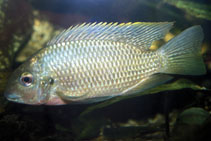| Family: |
Cichlidae (Cichlids), subfamily: Pseudocrenilabrinae |
| Max. size: |
40 cm TL (male/unsexed); max.weight: 1,000.0 g |
| Environment: |
demersal; freshwater, potamodromous |
| Distribution: |
Africa: upper Senegal, upper and middle Niger system, upper Comoe, Volta, Mono, Bénoué and Lake Chad (Ref. 53405). |
| Diagnosis: |
Dorsal spines (total): 14-16; Dorsal soft rays (total): 12-16; Anal spines: 3-3; Anal soft rays: 8-10. Diagnosis: lower pharyngeal bone about as long as broad with anterior lamella shorter than toothed area; median pharyngeal teeth not broadened; dorsal fin with 14-16 spines and 12-16 soft rays (mean 15, 13-15); 8-10 lower gill-rakers; bifurcated dark vertical bars on the upper half of flanks; dorsal and anal without orange-red upper margin; dorsal and caudal fins not or feebly blotched (Ref. 53405).
Description: deep-bodied; head relatively large; frontal profile slightly convex; caudal fin truncate to very moderately forked (Ref. 52307). Outer jaw teeth bicuspid and non-spatulate, inner jaw teeth tricuspid, posterior pharyngeal teeth tricuspid or quadricuspid; micro-gillrakers present; scales cycloid (Ref. 53405).
Coloration: in life: ground colour bluish or greenish-blue (Ref. 52307, 53405) to bronze or silvery (Ref. 52307), rather more dark brown on occiput and along dorsal-fin base (Ref. 53405). Upper 2/3 of sides and caudal peduncle with 7-8 blackish cross bars, of which 1st (at level of occiput) and last 2 (on caudal peduncle) never bifurcate; 1st cross bar placed below dorsal fin always bifurcate below upper lateral line, remaining bars sometimes bifurcate; upper margin of dorsal and caudal fins reddish; lower margin of anal and caudal fins grey; pelvic fins black; lower lip bluish; chin, isthmus and breast dark grey; lower part of cheek, opercle and pectoral-fin base pink to reddish (Ref. 53405). Soft dorsal and anal sometimes with some pale spots; intense red coloration typical for adults, especially in breeding specimens (Ref. 52307). |
| Biology: |
Probably pair-bonding, open substratum spawner, with both parents guarding the brood (Ref. 52307). |
| IUCN Red List Status: |
Least Concern (LC); Date assessed: 06 October 2019 Ref. (130435)
|
| Threat to humans: |
harmless |
Source and more info: www.fishbase.org. For personal, classroom, and other internal use only. Not for publication.
